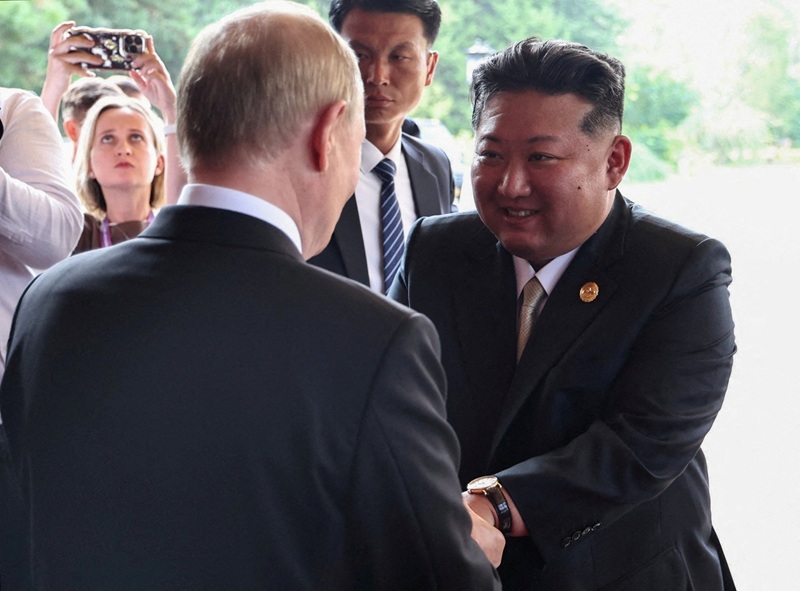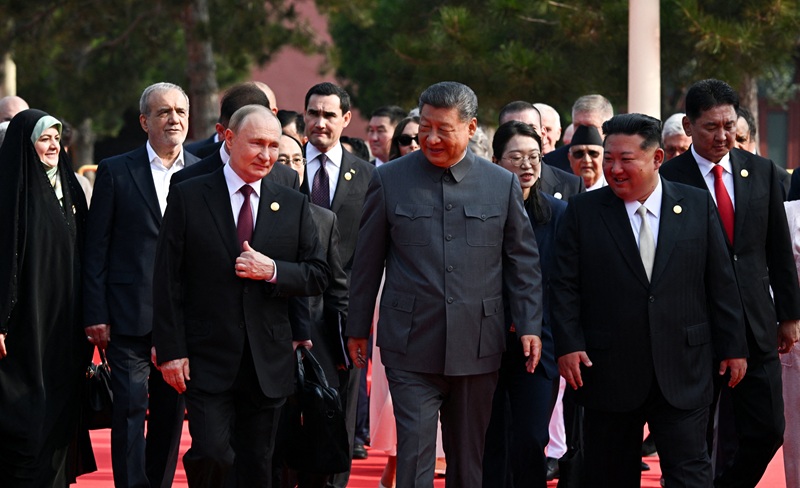Flanked by North Korean leader Kim Jong-un and Russian President Vladimir Putin in Beijing, Chinese President Xi Jinping sent a veiled warning to the United States against using pressure to rein in its adversaries as he presided over his country’s largest-ever military parade in decades to mark the 80th anniversary of the end of World War II on September 3.
“Humanity must choose between peace and war, between dialogue and confrontation,” Xi declared from the rostrum of Tiananmen Gate, promising that China would “adhere to the path of peaceful development.” His speech, delivered against a backdrop of roaring jet engines, an artillery salute and columns of China’s newest weaponry, signaled that the peace envisioned by the Chinese president is backed by his country’s ever-expanding military capabilities.
But the sight that reverberated far beyond Tiananmen Square, where the Chinese government brutally repressed pro-democracy demonstrations in 1989, was the image of Xi standing shoulder to shoulder with the two authoritarian leaders from Pyongyang and Moscow.
Kim, whose regime is under heavy international sanctions for his nuclear weapons program, and Putin, whose grinding invasion of Ukraine is now in its third year, were Xi’s most prominent guests. Footage released by Chinese state media showed them walking alongside Xi to the rostrum ahead of 23 other heads of state.
For Kim, whose trip to Beijing is only his second abroad in six years, standing beside Xi and Putin at Tiananmen offered a chance to project confidence in his protracted standoff with the United States, which has pressed his regime to abandon its nuclear and missile programs.
![North Korean leader Kim Jong-un arrives for a Chinese military parade in Beijing on Sept. 3 to mark the 80th anniversary of Japan's surrender in World War II. [JOINT PRESS CORPS]](https://koreajoongangdaily.joins.com/data/photo/2025/09/03/547e369e-7e9b-4fc6-af89-7439abb425ac.jpg)
“Kim has spoken of a ‘new Cold War’ and the need for solidarity against so-called U.S. imperialism. Now, he has highly symbolic photos to promote that narrative at home and abroad,” noted Leif-Eric Easley, a professor of international studies at Ewha Womans University in Seoul.
He added that “Kim can also claim a diplomatic victory as North Korea has gone from being unanimously sanctioned by the United Nations Security Council to being embraced by two permanent council members.”
For Putin, who has leaned on China and North Korea to blunt Western sanctions and procure key technological components, weapons and soldiers to sustain his war against Ukraine, the optics reinforced his claim that Russia is not alone in confronting the West.
Although Xi did not name the United States in his speech, he said China is a “great nation that is never intimidated by any bullies” in an apparent veiled reference to Washington and its allies, which have warned Beijing against cooperating with Moscow and Pyongyang amid signs of growing contacts between the three countries’ militaries.
Xi also said the “Chinese people’s rejuvenation cannot be blocked,” describing them as “unafraid of violence” and “standing on the right side of history” in apparent reference to his vision of reclaiming Taiwan, a self-governing island that Beijing characterizes as a renegade province.
Although Beijing’s official commemorations, including Wednesday’s parade, credit the Chinese Communist Party with defeating Japan in World War II, most historians note that it was the United States and the Kuomintang-led government — which retreated to Taiwan in 1949 after losing the Chinese Civil War — that bore the brunt of the fighting.
By choosing to highlight Kim and Putin’s attendance, Xi transformed what is ostensibly a commemorative event into a projection of a new geopolitical reality — one in which Pyongyang, Beijing and Moscow challenge the American-led global order and the U.S. military presence worldwide.
As if to underscore that point, the 90-minute ceremony highlighted China’s latest weaponry, which included hypersonic missiles designed to strike ships at sea, a new intercontinental ballistic missile and long, black underwater drones.
After the parade, Kim and Putin held a meeting at the Diaoyutai State Guesthouse, where he thanked the Russian president for praising North Korean troops and vowed to strengthen bilateral ties, according to Pyongyang’s state-controlled Korean Central News Agency.

Their joint appearance alongside Xi at the military parade on September 3 drew a muted reaction from the South Korean presidential office, which told reporters in a briefing later the same day that it has “no particular comment” while acknowledging that it is “watching developments closely.”
Lee Dong-gyu, a research fellow and China expert at the Asan Institute for Policy Studies, said that Xi’s choice of guests at the parade may signal to both South Korean President Lee Jae Myung and U.S. President Donald Trump that “they cannot achieve a breakthrough with Pyongyang without considering Beijing’s position.”
The parade took place just weeks after Lee and Trump held their first summit in Washington, where the U.S. president expressed interest in Lee’s offer to help renew talks with Kim, despite Pyongyang’s insistence that dialogue no longer serves its interests.

When initially asked about Kim, Xi and Putin’s gathering, Trump told reporters in Washington on September 2 he was “not worried at all.” Hours later, he turned to his preferred social media platform, Truth Social, with a more pointed remark for the Chinese president. “Please give my warmest regards to Vladimir Putin and Kim Jong-un as you conspire against the United States of America,” he wrote.
BY MICHAEL LEE [lee.junhyuk@joongang.co.kr]
![From left: Russian President Vladimir Putin, Chinese President Xi Jinping and North Korean leader Kim Jong-un are seen ahead of a military parade in Beijing on Sept. 3 to mark the 80th anniversary of Japan's defeat in World War II. [JOINT PRESS CORPS]](https://www.koreadailyus.com/wp-content/uploads/2025/09/0903-strongman.jpg)
![In LA Koreatown, illegal dumping lingers for months despite repeated complaints Household trash, including discarded Christmas trees, is dumped along a roadside near New Hampshire Avenue and James M. Wood Boulevard. [Sangjin Kim, The Korea Daily]](https://www.koreadailyus.com/wp-content/uploads/2026/02/0205-trash-100x70.jpg)


